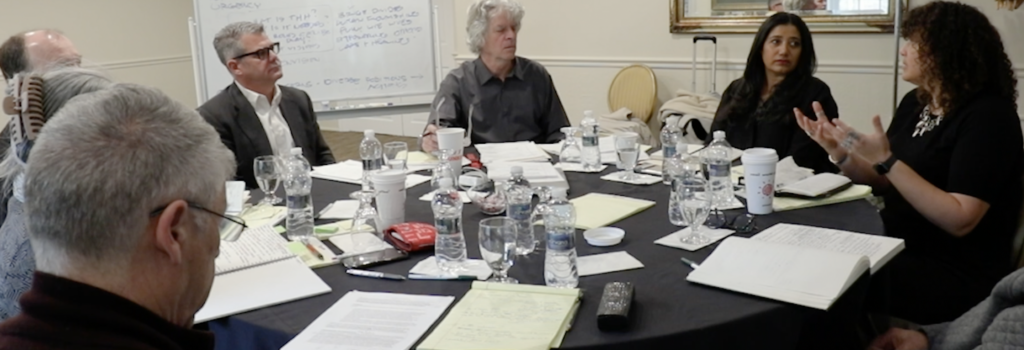Dennis Alan Winters
Tales of the Earth : Landscape Architecture, Toronto, Ontario, Canada gardens@talesoftheearth.com
Makers of landscape regard the physical expression of Utopia as the seed or cause of an ideal habitat, perfection in design as the tool. In Buddhist treatises, a making of Utopia is considered the result rather than the cause to inhabit. With a Twilight Zone’s ‘Heaven’ as baseline, this paper looks at grounds for Utopia’s being produced by cultivating Buddhist’s awakening mind.
Act 1. Utopia’s cheating heart
Midnight. Portrait of a man at work, the only work he knows. His name is Henry Francis Valentine, but he calls himself ‘Rocky’, because that’s been his life. A small-time hood on the wrong side of the law, caught robbing a pawnshop, shot by the police. He thinks it’s all over but he’s wrong; for Rocky Valentine, it’s just the beginning.1
Rocky opens his eyes and can’t quite believe where he’s ended: Money for nothin’, chicks for free and a pad he’d died for. Everything he couldn’t get in life, he got in death. Makes him wonder, “How come they let me in here. I thought it was like for school teachers? Must’ve been something real good I done. But what?”
Curious, because the potential part of the basic Buddhist equation speaks about landscape’s depending on mind and deeds through the operative Law of Cause and Effect.2 Chandrakirti’s Guide to the Middle Way says:
An undisciplined state of mind gives rise to delusions, causing negative actions that produce a dismal mundane landscape in which Rocky would be subject to live. Whereas a disciplined and virtuous mind gives rise to insight, enabling Rocky to perform positive actions of body, speech and mind, producing an enticing, productive, beautiful Utopia in which to live.3
Contained within is the matter of non-duality. As object of the mind, Utopia wouldn’t exist separately from Rocky’s mind.4 Even non-Buddhists Emerson and Magritte, Brunton and Merleau-Ponty said that perceived exterior landscape is only an expression of the internal experience. Buddha said, – All three realms: heaven, earth and the underworld, are of the mind.5
Which helps explain why, when the Buddha transformed the Jetavana Monastery into a landscape of garlands of jewelled trees and radiant flowers, rivers of fragrant waters, cloudpalaces of music and song, and flower ornaments pervading all of space, disciples had not cultivated the virtues to see it.6
Secondly, the natural part of the basic Buddhist equation has each Buddhist school in its unique way interpreting the Heart Sutra’s, Form is Void and Voidness if Form, questioningif Rocky’s Utopia even exists; if it does or doesn’t, how and why?
Japanese Soto Zen’s Dōgen Zenji said, – I came to realize clearly that mind is no other than mountains and rivers and the great earth.7 The Mind-Only School posits, – There’s no ‘external objects’ out there; no Utopia to be found existing separately from Rocky’s mind.
The Middle-Way School posits, – Although Utopia may appear to exist of its own accord, it doesn’t. Like an illusion, or a dream, Utopia merely arises in dependence upon causes and conditions imputed by the mind. The Dalai Lama’s debate teacher Serkong Rinpoche said, – Take a walk through the woods, look for your mind and tell me what you find.8
Is Rocky’s Utopia an anomaly, my thesis half-baked? Following these basic Buddhist lines, there’s an apparent disconnect between Rocky Valentine’s mind and his Utopia? Either way, you can’t even tell your kid to go outside to play anymore.
Act 2. Utopia Unplugged
What in his capacity might enable Rocky to have his Utopia and be eaten by it too? For Rocky’s internal Utopia to sustain an external Utopia, and visa versa? For this, we go back 2500 years ago to hear the Vimalakirti Sutra, where five hundred of the Licchavi tribe of northern India visit Buddha Shakyamuni, planting their parasols of precious jewels into the ground, gifts to the Buddha.9
Everyone seated, the Buddha causes the precious parasols to levitate, transforming their undersides into a pristine canopy of limitless mansions of suns, moons, stellar bodies, realms of king mountains and queen waters, the voices of all Buddhas of the ten directions teaching in all the worlds. Then, as quickly as he apparates Utopia, the Buddha lays the parasols to rest.
Mesmerized, the tribe’s leader asks, – How did you do that? Can anyone inhabit such beauty? Can anyone create such beauty? Buddha replies, – The magnificent landscape you witnessed was none other than the Buddha’s mind appearing as landscape; landscape appearing as Buddha’s mind, the cultivation of pure action, compassion and wisdom.
In other words, rather than landscape interdependently produced by ‘I want’, ‘I don’t want’, ‘I don’t care’, Rocky’s mode of operating, this is landscape composed of thoughts and acts of Buddhas and Bodhisattvas: landscape as field of generosity; landscape as field of virtuous application; as field of patience; of meritorious effort; of concentration; of wisdom realizing the Nature of Reality and the Reality of Nature. Landscape as active verb, rather than noun.10
As an active verb, can this landscape as Six Perfections even be designed as form and space? What would it look like?
Contrary to wistful imagery and belief, this Landscape as Six Perfections won’t necessarily look like the Buddha’s production, nor abide anywhere else, in any other ethereal realm or time. No Twilight Zone, this Utopia Landscape of Six Perfections. Just as it is, this Landscape of Six Perfections is present right here, this place, this realm, this time. Think landscape as Rocky’s own city, farmland, and community inhabited by us all; fields ripe for undivided love and compassionate work. Think promise between Rocky and landscape to take care of each another. Think, from the Bodhisattva’s perspective, whatever it takes to fulfill the need.
Once again the perplexing question: is Rocky’s Utopia an anomaly, my thesis half-baked? Will Rocky Valentine’s external Twilight Zone Utopia cultivate his internal Utopia of eternal bliss?
Well, just because his Utopia is pretty, doesn’t mean Rocky Valentine is at play in the fields of the Lord. Rocky’s problem is that it’s still all about Rocky. His slice of Heaven, his Shangri-La, his Utopia, his at the expense of everyone else.
Apparently, Rocky’s positive thoughts and acts are insufficient to inhabit his Utopia; the physical expression of Utopia would be the result rather than the cause to inhabit. Looks like Heaven; begins to taste like Hell. Buddha’s First Noble Truth of Suffering, operating in death as it does in life: never enough or it’s way too much; too much and still not enough; pain, and the pervasive unfolding of consciousness. One month, and the shine wears off. “Pip, Someone must have goofed. If I gotta stay here another day, I’m gonna go nuts! Look, I don’t belong in Heaven. I wanna go to the other place.”
“Heaven?” sneers Pip. “Whatever gave you the idea you were in Heaven, Mr. Valentine? Why this is the other place! And it appears the paper’s premise is correct.
A scared, angry little man who never got a break. Now he has everything he’s ever wanted – and he’s going to have to live with it for eternity, or choose to take this time to turn things around. It’s up to him – in The Twilight Zone, in Heaven as it is on Earth.
References
1 Reprised from The Twilight Zone, season 1 episode 28, “A Nice Place to Visit” by Charles Beaumont, April 15, 1960. 2 Although cause and effect reflects thoughts and acts over many lifetimes, it’s not a simple one-leads-toone arithmetic equation. Given the possible algorithms, combinations and permutations, Rocky could be living his Utopia because of some previous positive incarnations of his. See Pabongka Rinpoche. Michael Richards, trans. Liberation in the Palm of Your Hand (Boston: Wisdom Publications, 1991): 431-470.
- Oral teaching by His Holiness the XIV Dalai Lama on Chandrakirti’s Guide to the Middle Way
- Through the “Twelve Links of Dependent Origination”
- See Geshe Kelsang Gyatso. Meaningful to Behold (Cumbria: Wisdom Publications, 1980): 339
- See Thomas Cleary. The Flower-Ornament Sutra: A Translation of the Avatamsaka Sutra, Volume I (Boulder: Shambala, 1984): 31
- See Dogen. Shobogenzo. Book 1. “The Voices of the River-Valley and the Form of the Mountains”(Woking, Surrey: Windbell, 1994)
- See Jeffrey Hopkins. Meditations on Emptiness (London: Wisdom Publications, 1983)
- See Hisamatsu Shin’ichi. A Talk on the Vimalakirti Sutra (The FAS Society Journal, 1997): 133-140;
Robert Thurman, trans. The Holy Teaching of Vimalakirti (University Park, PA: Pennsylvania State University, 2001) 10 See Edward Conze, trans. The Large Sutra on Perfect Wisdom (Delhi: Motilal Banarsidass, 1979): 176, 227, 331, 417, 618. In a manner of speaking, a Bodhisattva is someone of the 1% on the spiritual path engaged to requisition 99% of consciousness capacity; contrast that with the 99% relying on 1% of consciousness capacity.




